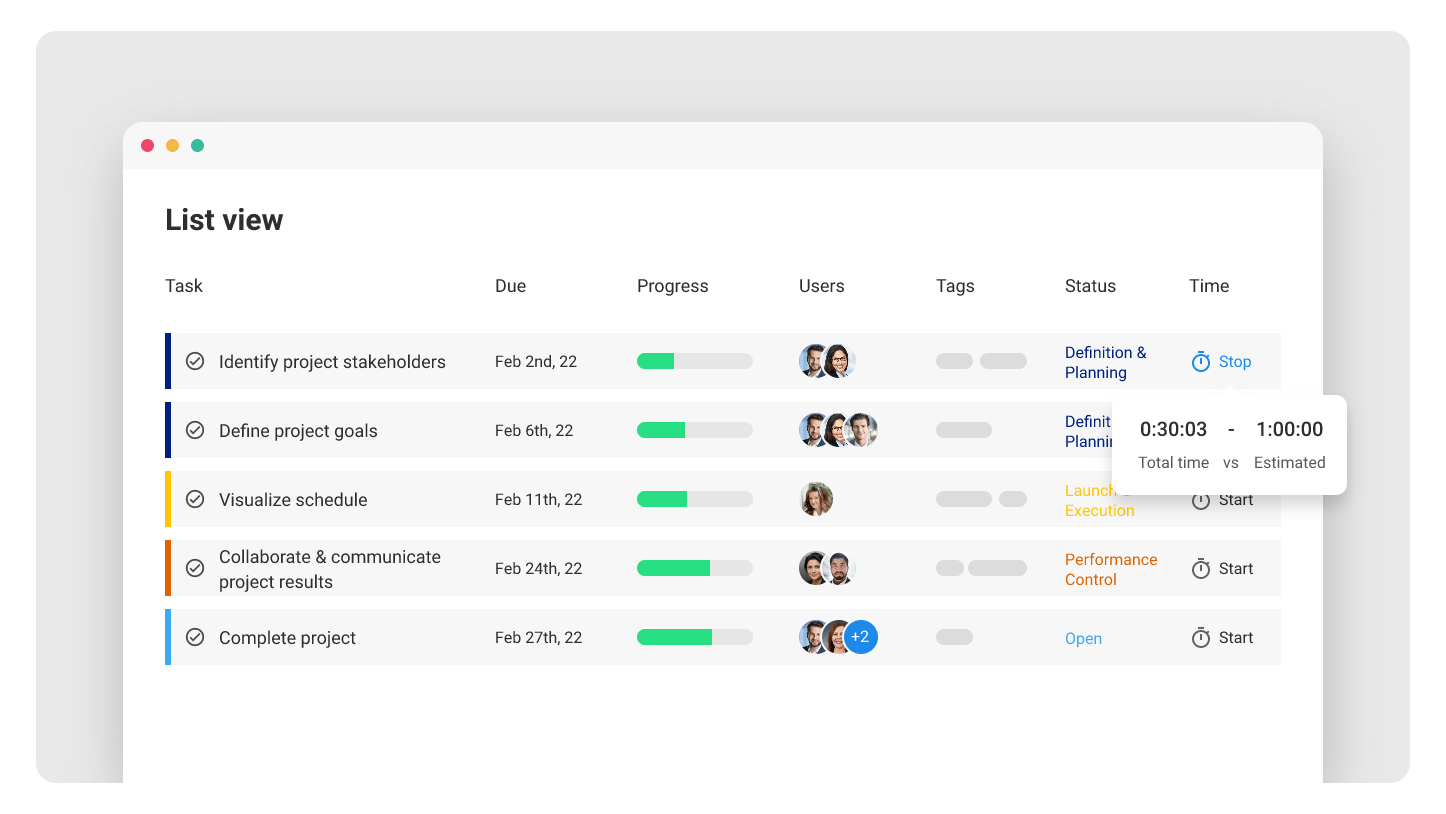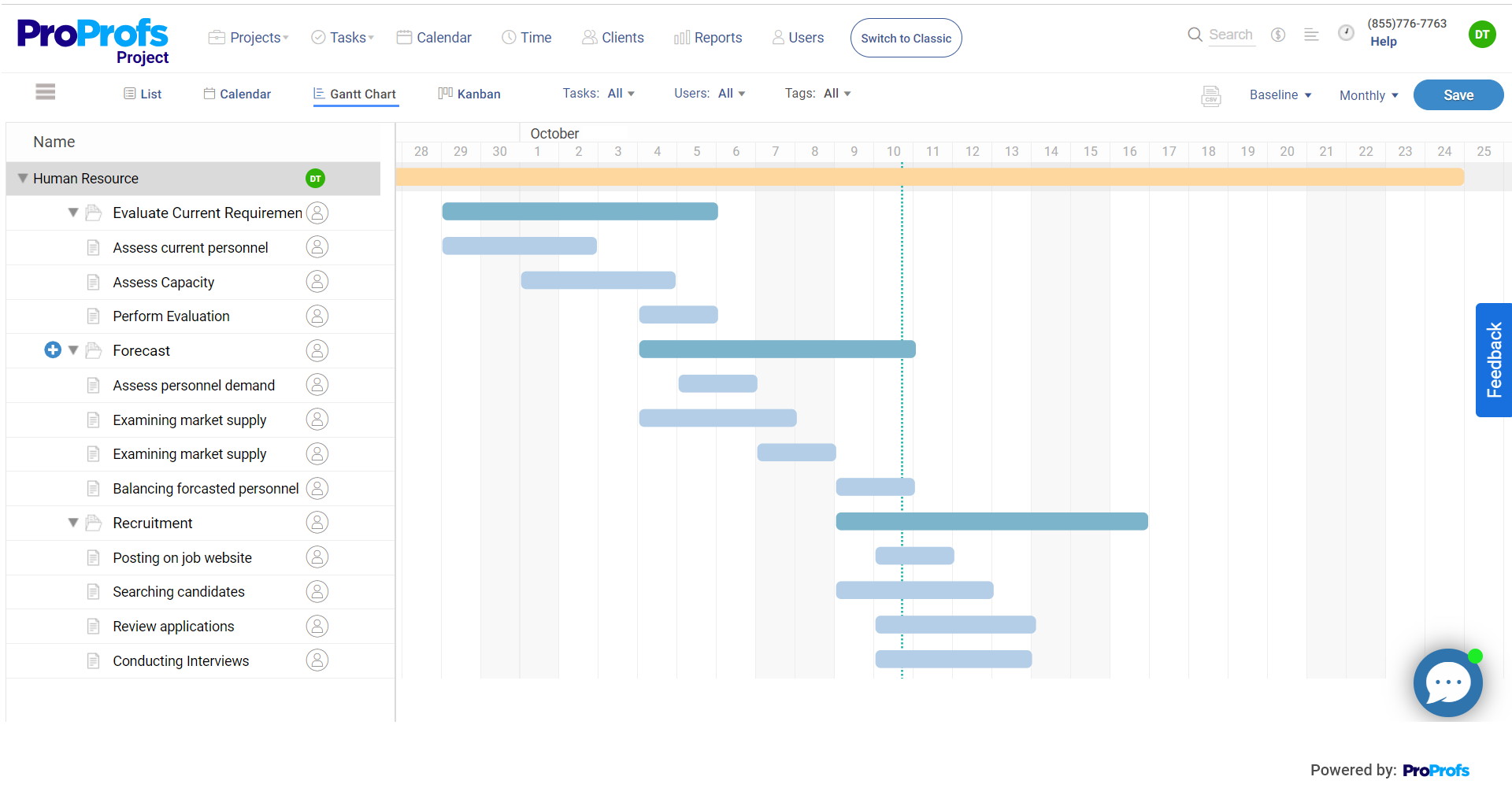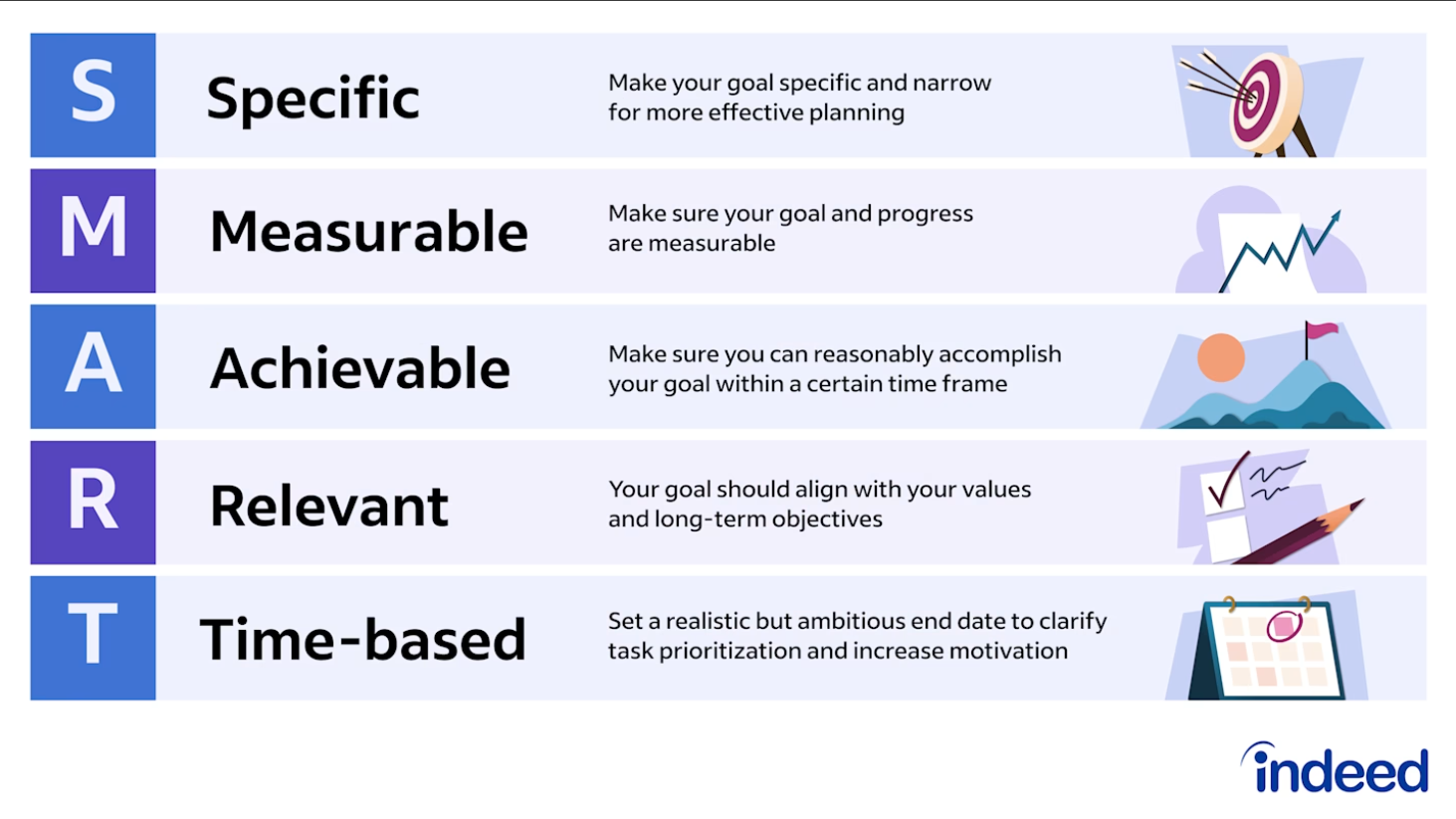Managing software projects for 10+ years now, I’ve seen how poor time management can lead to project failure—in fact, 39% of projects fail.
Effective project time management is more than just meeting deadlines; it’s about aligning tasks, resources, and goals to ensure smooth project execution.
Managing multiple tasks and deadlines requires a structured approach. Without one, projects risk missing key milestones, leading to confusion and delays.
In this article, we’ll discuss project time management, break down the process, discuss strategies to improve time management, and address common challenges project managers face.
What Is Project Time Management?
Project time management refers to planning, scheduling, and controlling the amount of time spent on various activities within a project. It involves balancing the demands of deadlines, task dependencies, resource allocation, and potential risks that can impact the project schedule.
Project time management process ensures the project is completed on time and within budget. This is crucial for client satisfaction and meeting organizational objectives. A well-managed project timeline enables the team to stay on track, avoid delays, and deliver the project as planned.
For example, in a website development project, project time management would involve setting deadlines for each phase, such as design, coding, and testing, to ensure the project is completed on time.
Want to see how this works in practice? Here’s how Cleveland State University mastered time tracking and project management using ProProfs Project:

What Are the Key Elements in Project Time Management?
Effective project time management revolves around several key components contributing to a well-executed project schedule. Here are those:
1. Project Scheduling
Scheduling is a fundamental part of time management. It involves creating a detailed timeline that lists tasks, deadlines, milestones, and dependencies.
A schedule provides visibility into the project’s timeline, helping the team focus on essential tasks.
Example:
In a software development project, scheduling would include setting milestones like “Requirement Gathering,” “Development,” and “Testing,” each with defined deadlines and dependencies.
2. Time Estimation
Accurately estimating how long each task will take is crucial for setting realistic expectations. It helps prevent overcommitting and ensures adequate resources are allocated to meet deadlines.
Time estimation methods, such as expert judgment, historical data, or analogous estimation, are typically used.
Example:
Tools like historical data or a work breakdown structure (WBS) can help estimate tasks more accurately and refine timelines based on previous similar projects.
3. Resource Allocation
Resource allocation refers to assigning the right people, tools, or materials to the appropriate tasks at the right time.
This ensures that the project has the necessary resources to proceed without delays.
Example:
In a construction project, ensuring that the carpenters are available for the framing stage while the electricians are prepared for the wiring stage helps prevent delays.
4. Task Prioritization
Prioritizing tasks helps the project manager and team focus on the most critical and time-sensitive activities first.
Effective prioritization involves identifying critical tasks that need to be done before others can begin.
Bonus Tip: Use the “Eisenhower Matrix” to categorize tasks into urgent and essential categories, allowing the team to focus on the tasks that truly matter.
5. Monitoring & Controlling
Regular project schedule monitoring is essential to tracking progress and identifying deviations from the plan.
If the project is behind schedule, corrective measures can be implemented to get things back on track.
Example:
If a development task runs behind, the project manager may reassign team members or adjust the timeline to accommodate the delay.
What Are the Steps in the Project Time Management Process?
Project time management involves several steps to ensure the project is completed within the required time frame. Below are the key steps involved:
1. Plan the Schedule

The first step in time management is creating a project schedule. This involves identifying the tasks and milestones, estimating the time required for each task, and determining dependencies.
A project schedule can be created using project management tools like Gantt charts, which help visualize the timeline.
Pro Tip: Break down high-level tasks into smaller, actionable subtasks to ensure clarity and prevent missed steps.
2. Define Activities
Defining activities ensures that every task is well understood and that no important aspects of the project are overlooked.
At this stage, it is essential to break down the project into smaller, manageable tasks (Work Breakdown Structure, or WBS).
For example, for a website development project, define activities like “Design Mockups,” “Develop Backend,” and “Test User Interface” as discrete tasks to streamline execution.
3. Estimate the Duration
Once activities are defined, project managers estimate the duration of each task.
This step requires a combination of expert judgment, historical data, and experience to ensure that time estimates are as accurate as possible.
Pro Tip: Use Monte Carlo simulations for complex projects to predict delays based on historical data and resource availability.
4. Prepare the Schedule
This step combines the estimated task durations to create the project schedule.
Dependencies between tasks are identified, and scheduling techniques like Critical Path Method (CPM) or Program Evaluation and Review Technique (PERT) may be used to calculate the longest path and determine critical milestones.
For example, in a product launch project, use CPM to identify the critical tasks that must be completed on time to avoid delays in the entire schedule.
5. Monitor & Control
Once the project begins, monitoring progress against the project schedule is essential.
Project managers track actual progress, compare it with planned progress, and make adjustments to keep the project on track.
This may involve shifting resources, reassigning tasks, or altering deadlines.
Pro Tip: Set milestone reviews and regular progress check-ins to ensure any discrepancies are caught early, allowing for quick corrective action.
6. Adjust the Schedule as Needed
Changes or unforeseen challenges may arise throughout the project, making it necessary to adjust the schedule.
Flexibility is key when managing project time, and a good project manager will anticipate delays or changes and adapt the schedule accordingly.
For example, reassign resources or extend deadlines if a critical task is delayed. Adjusting timelines for non-critical tasks can free up space and keep the project on track.
Pro Tip: Use rolling wave planning, where detailed scheduling is done for short-term tasks while the long-term tasks are kept flexible.
What Are Some Effective Time Management Strategies for Projects?
As we have already stated, time management is one of the significant challenges you confront during the project development cycle.
However, this cannot be used as an excuse against delays, as clients have paid you for timely deliverables. So, master the art of managing time and maintain your credibility for the long term.
We are going to uncover impeccable time management strategies to make the life of project managers easier, so let’s get started:
1. Deploy a Project Management Tool

Using the right project management tools and equipment is the key to smoothing your project time management journey.
Unarguably, you encounter expected and unexpected situations during the project life cycle, making it difficult to deliver timely results.
The best way to handle ever-changing project requirements is to deploy an inimitable project management tool. It can take away your pain points regarding project progress and enable you to save a significant amount of time.
A Project Management software helps you gain recognition from every corner of the world. Here are some of its impressive features that can help you in project time management:
- Time tracking
- Intuitive dashboard
- Gantt charts
- Recurring task management
2. Set Clear Priorities
Project management is all about properly setting priorities so the workflow doesn’t hamper at any cost. Note that things can go out of your control as long as project tasks pile up. Therefore, make your project tasks manageable by dividing them into smaller segments for perfect distribution.
It’s crucial to separate urgent and essential tasks you’ve on your to-do list, to get proper clarity on what you need to do first. Here’s how you can categorize your project tasks:
- Important and urgent – Complete these tasks first
- Important but not urgent – Schedule these tasks for later
- Not important but urgent – Delegate these tasks aptly
- Not important and not urgent – Work on these tasks after completing crucial ones
3. Complete Project Tasks One by One
Project time management is strict, but it’s the key to unprecedented business growth. Companies generally expect multitasking abilities from their project teams to keep the time factor in check.
They think doing multiple tasks at once will save them notable hours, which they can use for productive work. And this mindset fits the bill somewhere, doesn’t it?
However, multitasking has a dark side: ‘Quality gets compromised, leading to rework and unnecessary time consumption.’
So, complete project tasks one by one to avoid time-killing rework.
4. Set Shorter Deadlines
Being a project manager, you should ease your team’s minds, at least for a healthy environment. But when you give more than enough time for a particular task, your project executives will likely enter a state of rest mode, as it’s a human tendency.
Once they become slowpokes, the odds of delays will undoubtedly increase, making it challenging to complete your project.
Therefore, set shorter deadlines so that your project team maintains actual speed while doing their work.
Note: Shorter deadlines don’t mean setting unrealistic timelines, as that will only create differences and result in employee turnover.
5. Learn to Say ‘No’
Project managers’ lives have never been easy, as they constantly experience the pressure of delivering expected results. Things get worse when clients demand changes in project activities due to their ever-developing business requirements.
Most of the time, project managers accept the changes demanded without requesting to revise the preset deadlines. As a consequence, their whole team gets under the pump and struggles to deliver satisfactory results, which, in turn, leads to rework and time waste.
For perfect time management in project management, you must be aware of your work limits. And saying ‘No’ is not as bad as it sounds. You must explain your situation to clients appropriately to gain an extension on deadlines.
You and your clients will figure out something if you take care of these two things during the discussion.
- Give a valid reason: Explain your current essential tasks and how the requested changes can affect the project progress.
- Don’t lie: Lying for a time extension is unethical and can affect your client relationships badly. Hence, be open about why you need more time to complete the job.
6. Give Positive Feedback to Top-Performing Employees
The easiest way to save time during the project life cycle is to give positive feedback to top-performing employees.
A project team comprises individuals with different skill sets. Some like completing their assignments before the deadline. You need to identify those executives and give them due appreciation.
Your positive feedback will bring two-fold advantages:
- Your top-performing employees’ confidence level will increase after recognition for their good work, so that better work will be done.
- Other project executives will strive to raise the bar to earn your appreciation, leading to high productivity.
These two aspects will aid you in delivering project deliverables before the stipulated time and bolster client relationships.
Your few positive words can do wonders for your whole project team and pave the way for seamless time management.
What Are the Common Challenges in Project Time Management?
While project time management is essential, many challenges impede effective time management. Here are some common issues:
1. Scope Creep
Uncontrolled changes or continuous expansion of the project scope, also known as scope creep, can lead to delays and added costs.
To avoid this, set clear project boundaries and manage stakeholder expectations carefully. Setting clear goals protects your team.
Make them SMART, tie them to real numbers, and get stakeholder buy-in early. Trust me, it’s worth the upfront effort.

2. Unrealistic Deadlines
Setting too aggressive or unrealistic deadlines can cause stress and lower productivity.
Estimating time based on realistic data and buffer time for unforeseen challenges is essential.
To avoid this, set deadlines based on historical data and realistic time estimates, including buffer time for potential challenges.
Regularly reassess timelines to stay flexible.
3. Resource Shortages
Insufficient resources—whether manpower, tools, or materials—can significantly delay project timelines.
Resource allocation should be carefully planned, and alternatives should be considered in case of shortages.
To avoid this, plan resource allocation carefully and maintain contingency plans to ensure alternative resources are available when necessary to prevent delays.
4. Poor Communication
Miscommunication or lack of communication between team members and stakeholders can lead to misunderstandings and delays.
Regular meetings and updates are essential to keep everyone aligned.
To avoid this, foster open communication through regular check-ins, status updates, and clear channels for team collaboration to prevent misunderstandings and ensure alignment.
5. Inadequate Time Tracking
If time is not tracked correctly, it can lead to inefficiencies and delays. Implementing time tracking tools and regularly reviewing progress can help avoid this issue.
To avoid this, use time tracking tools to monitor project progress in real-time, enabling quick identification of bottlenecks and adjustments to ensure deadlines are met.
Improve Time Management & Project Success with Effective Project Time Management
Effective project time management is crucial for meeting deadlines and delivering results. By focusing on key elements like scheduling, resource allocation, and task prioritization, project managers can ensure smooth project execution. The process, from planning the schedule to making necessary adjustments, helps teams stay on track and avoid delays.
This blog outlined practical steps and strategies to improve project time management, emphasizing the importance of planning, estimating, and monitoring tasks. These approaches keep projects aligned with goals and deadlines.
ProProfs Project simplifies time management with its intuitive interface and AI features like automated task assignments and real-time tracking. It helps managers stay on schedule, allocate resources efficiently, and automate tasks, ensuring successful project outcomes.
FREE. All Features. FOREVER!
Try our Forever FREE account with all premium features!





